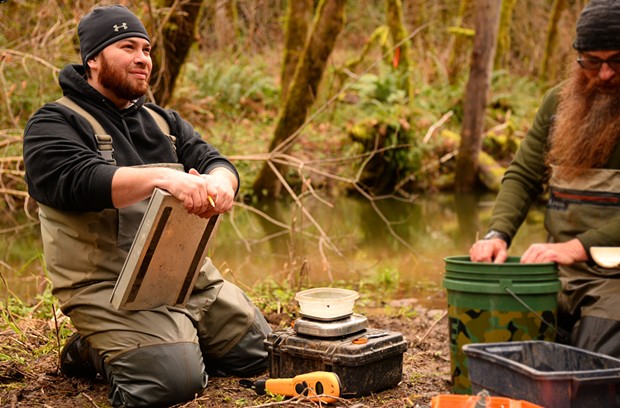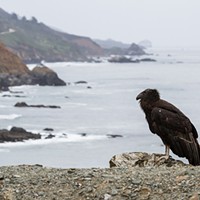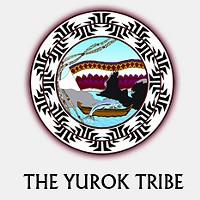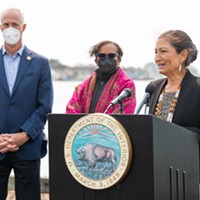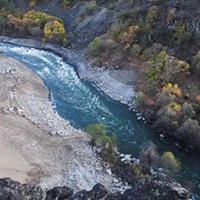Monday, June 10, 2019
Yurok Tribe Awarded UN Honor for Forest Management Practices
Posted By Kimberly Wear @kimberly_wear on Mon, Jun 10, 2019 at 4:21 PM
The Yurok Tribe recently became the first indigenous community in the United States to be awarded the Equator Prize by the United Nations Development Programme, which honors “innovative nature-based solutions for tackling climate change, environment and poverty challenges.”
“We are honored to receive recognition for our traditional ecological knowledge and western science-based approach to managing the temperate rainforests in our region,” tribal Chair Joseph L. James said in a release about the June 5 announcement. “Our tribe is rebuilding biodiversity in our forests and restoring resilience within our community. This time-tested strategy for rehabilitating critical habitats can be duplicated all over the world to reduce the impact of climate change.”
Created by former UN Secretary-General Kofi Annan, the United Nation Development Programme “works to eradicate poverty while protecting the planet” by helping countries “develop strong policies, skills, partnerships and institutions so they can sustain their progress,” according to the program’s webpage.
The Equator Prize, awarded since 2002, comes with a $10,000 award and the opportunity for each of this year’s 22 winners from around the world to send two representatives to attend a week-long summit in New York City during the 74th UN General Assembly. The honorees will also be recognized at a ceremony Sept. 24.
The Yurok Tribe was selected for reclaiming more than 60,000 acres of ancestral lands that were stolen in the 19th century and clear-cut over the ensuring decades. Those forests, according to the tribe, are now managed by Yurok citizens to “re-create the diverse ecological conditions that existed on these lands for millennia” and provide for “the production of traditional foods, medicines and basket materials, as well as carbon sequestration.”
Engrained in the Yurok Constitution's principles to "preserve and promote" the tribe's culture, language and religious beliefs — which includes the reintroduction of the California condor as well as restoring their land's natural resources — the tribe financed the purchase with its carbon-offset forest project, which was the first developed under California protocols for the state’s cap-and-trade system back in 2014.
“We are blending the knowledge of ancestors with contemporary science to fix our forests and improve ecosystem health within our homeland,” said James. “We are very grateful for the recognition of this essential endeavor. We have made tremendous sacrifices to reclaim our right to determine our own destiny and be a strong steward of our land.”
Read the full release from the Yurok Tribe:
Read the UN Development Programme release below:
“We are honored to receive recognition for our traditional ecological knowledge and western science-based approach to managing the temperate rainforests in our region,” tribal Chair Joseph L. James said in a release about the June 5 announcement. “Our tribe is rebuilding biodiversity in our forests and restoring resilience within our community. This time-tested strategy for rehabilitating critical habitats can be duplicated all over the world to reduce the impact of climate change.”
Created by former UN Secretary-General Kofi Annan, the United Nation Development Programme “works to eradicate poverty while protecting the planet” by helping countries “develop strong policies, skills, partnerships and institutions so they can sustain their progress,” according to the program’s webpage.
The Equator Prize, awarded since 2002, comes with a $10,000 award and the opportunity for each of this year’s 22 winners from around the world to send two representatives to attend a week-long summit in New York City during the 74th UN General Assembly. The honorees will also be recognized at a ceremony Sept. 24.
The Yurok Tribe was selected for reclaiming more than 60,000 acres of ancestral lands that were stolen in the 19th century and clear-cut over the ensuring decades. Those forests, according to the tribe, are now managed by Yurok citizens to “re-create the diverse ecological conditions that existed on these lands for millennia” and provide for “the production of traditional foods, medicines and basket materials, as well as carbon sequestration.”
Engrained in the Yurok Constitution's principles to "preserve and promote" the tribe's culture, language and religious beliefs — which includes the reintroduction of the California condor as well as restoring their land's natural resources — the tribe financed the purchase with its carbon-offset forest project, which was the first developed under California protocols for the state’s cap-and-trade system back in 2014.
“We are blending the knowledge of ancestors with contemporary science to fix our forests and improve ecosystem health within our homeland,” said James. “We are very grateful for the recognition of this essential endeavor. We have made tremendous sacrifices to reclaim our right to determine our own destiny and be a strong steward of our land.”
Read the full release from the Yurok Tribe:
Today, the Yurok Tribe was selected as one of the first indigenous organizations in the United States to receive the United Nations Development Programme’s prestigious Equator Prize.
“We are honored to receive recognition for our traditional ecological knowledge and western science-based approach to managing the temperate rainforests in our region,” said Joseph L. James, the Chairman of the Yurok Tribe. “Our tribe is rebuilding biodiversity in our forests and restoring resilience within our community. This time-tested strategy for rehabilitating critical habitats can be duplicated all over the world to reduce the impact of climate change.”
The Equator Prize, created by the Equator Initiative, aims to acknowledge groups that are implementing nature-base solutions to address climate change, environmental degradation and poverty. This year’s 22 winners were selected from a pool of 847 nominations across 127 countries by a technical team comprised of internationally renowned experts. The 22 organizations will be honored at a gala on September 24, 2019 in New York. Each will also receive $10,000 and will have an opportunity to send two representatives to the 74th UN General Assembly.
Since 2012, the Tribe has reacquired more than 60,000 acres of forest taken from Yurok people in the late 19th century. Much of the woodlands were clear-cut by an industrial timber company and further scarred by hundreds of miles of hastily built logging roads. The combination of insults to the natural landscape had catastrophic impacts on culturally invaluable fish and wildlife populations. Today, the Tribe is employing Yurok citizens to re-create the diverse ecological conditions that existed on these lands for millennia. These forests are now managed for the production of traditional foods, medicines and basket materials as well as carbon sequestration. The centerpiece of this holistic project is the development of the Yurok Old-growth Forest and Salmon Sanctuary in the Blue Creek watershed, which is one of the most important tributaries on the Klamath River for salmon and sacred ceremonial practices.
“We are blending the knowledge of ancestors with contemporary science to fix our forests and improve ecosystem health within our homeland,” said Chairman James. “We are very grateful for the recognition of this essential endeavor. We have made tremendous sacrifices to reclaim our right to determine our own destiny and be a strong steward of our land.”
The Yurok Tribe is the largest Tribe in California with more than 6,000 members. The Tribe’s ancestral territory comprises 7.5 percent of the California coastline and is home to the Klamath River, the lifeline of the Yurok people. The Tribe’s major economic and natural resource initiatives include condor reintroduction, fisheries protection, restoration and management, dam removal, natural resources protection, sustainable economic development enterprises and land acquisition.
Read the UN Development Programme release below:
New York, June 5 – The UN Development Programme (UNDP) and partners announced today the winners of the 10th Equator Prize, recognizing 22 local and indigenous communities from across the world. The winning organizations, which showcase innovative, nature-based solutions for tackling climate change, environment, and poverty challenges, will be honored at a celebratory gala on 24 September in New York.
This is the first time the Equator Prize has been awarded to groups from Guinea-Bissau, as well as to indigenous communities in Australia and the United States. Winners are also based in Benin, Brazil, Cameroon, Ecuador, India, Indonesia, Kenya, Micronesia, Nigeria, Pakistan, Peru, Tanzania and Vanuatu.
UNDP Administrator, Achim Steiner stated, “Every day, thousands of local communities and indigenous peoples around the world are quietly implementing innovative nature-based solutions to mitigate and adapt to climate change. The Equator Prize is both a recognition of their exceptional ideas and a way to showcase the power of people and grassroots communities to bring about real change.”
The winners were selected from a pool of 847 nominations across 127 countries by an independent Technical Advisory Committee of internationally renowned experts. The four-stage selection process emphasized community-based approaches that provide a blueprint for replication and scaling solutions to address our climate crisis.
Equator Prize winners will each receive US$10,000 and the opportunity for two community representatives to join a week-long summit in New York during the 74th United Nations General Assembly. They will be celebrated at the Equator Prize Award Ceremony on 24 September 2019, at the Town Hall theatre in Midtown Manhattan, featuring celebrities, government and UN officials, civil society, and the media. The winners will join a network of 223 communities from 78 countries that have received the Equator Prize since its inception in 2002.
The Equator Prize has been supported by former Heads of State Gro Harlem Brundtland and Oscar Arias, Nobel Prize winners Al Gore and Elinor Ostrom, thought leaders Jane Goodall and Jeffrey Sachs, indigenous rights leader Vicky Tauli-Corpuz, philanthropists Richard Branson and Ted Turner, and celebrities Edward Norton, Alec Baldwin, Gisele Bündchen, and many more. Partners of the Equator Initiative include the governments of Germany, Norway, and Sweden, as well as Conservation International, the Convention on Biological Diversity, EcoAgriculture Partners, Fordham University, the International Union for Conservation of Nature, The Nature Conservancy, PCI Media Impact, Rainforest Foundation Norway, Rare, UN Environment, UNDP, UN Foundation, USAID, WWF, and the Wildlife Conservation Society.
For more information, please visit www.equatorinitiative.org or join the conversation on Facebook or Twitter by using #EquatorPrize.
Speaking of...
Comments
Showing 1-1 of 1
Readers also liked…
more from the author
-
Eureka Man Killed in SoHum Crash
- Jul 1, 2024
-
Caltrans Selects Tunnel Option for Last Chance Grade
- Jun 18, 2024
-
Kyle Steven Wear: 1970 —2024
- Jun 16, 2024
- More »
